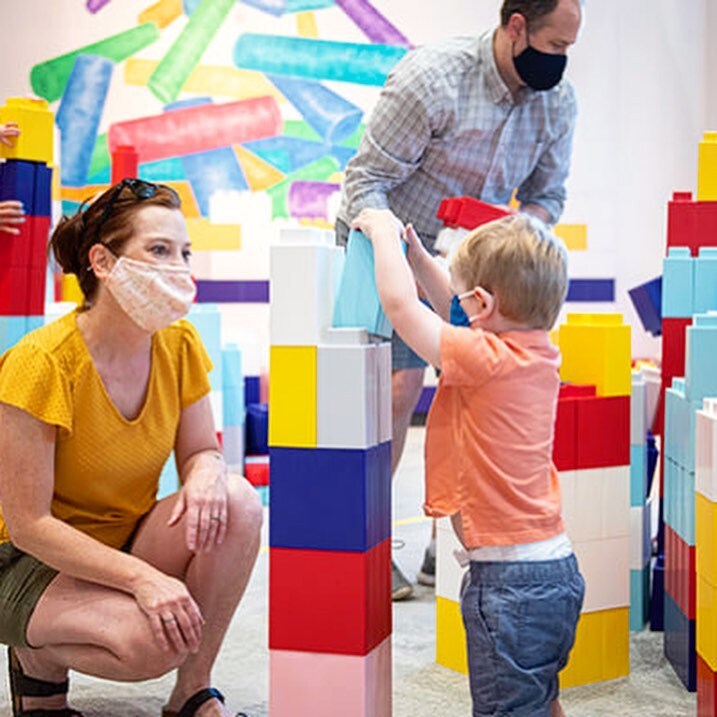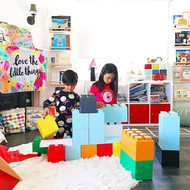How Construction Play Builds Young Brains
Posted by Kate Murphy on Jul 2nd 2025
Good news for the little ones—it's time to get building!
Whether it’s stacking oversized blocks, creating a castle with friends, or solving how to balance one piece on another, these build-from-scratch moments of “play” are doing serious work under the surface. They help develop the brain.
As school leaders and educators seek meaningful ways to support whole-child development, interest in play-based learning keeps garnering attention. The benefits of construction play, especially with tools like EverBlock® modular building systems, offer a blend of creativity, critical thinking, and hands-on engagement. Here’s how construction play supports the growing brain and how it lays the foundation for lifelong learning.

What Is Construction Play?
Construction play, or constructive play, is a type of hands-on, open-ended play where children use physical materials to build, stack, design, or assemble something. It’s a form of manipulative play—stacking blocks, assembling puzzles, or building with everyday items like boxes and recycled materials. By handling objects, planning designs, and building structures, children learn to share materials, take turns, and collaborate to create something new.
In early childhood education, construction play is highly valued for its role in supporting cognitive development. In fact, construction-based play supports multiple areas:
- Math: Encourages counting, shape recognition, and understanding of size and symmetry.
- Science: Demonstrates gravity, balance, and cause and effect while building problem-solving skills.
- Language: Expands vocabulary through discussion and guided learning.
- Creativity and Imagination: Sparks original ideas, design thinking, and storytelling through small-world play.
- Physical Skills: Builds fine and gross motor coordination.
- Social Skills: Fosters teamwork, communication, and collaboration.
- Understanding the World: Helps children explore materials and how objects can represent others.
- Curiosity: Promotes hands-on exploration and experimentation.
- Self-Esteem: Boosts confidence as children shape and control their own environment.
A survey found that nine out of 10 teachers say students are most engaged during hands-on activities, and over 80% report that learning through play improves collaboration, problem-solving, self-motivation, and knowledge retention. Meanwhile, 89% of students say their favorite way to learn is through interactive, experience-based activities.
Tools like EverBlock®’s modular building blocks and free-play sets are especially well-suited for classrooms, offering durable and versatile systems that encourage open-ended play and active learning. They’re ideal for teaching lateral thinking and three-dimensional problem-solving skills.
Brain Development and Constructive Play
Constructive play is uniquely powerful because it activates multiple areas of the brain at once.
- Motor Cortex: Children use their hands to grasp, connect, and balance pieces, using hand-eye coordination, muscle memory, and fine motor skills.
- Visual-Spatial Processing Centers: Kids must visualize their design and understand how shapes fit together in space. This develops the occipital (vision) and parietal (sensory data) lobes—critical for spatial awareness and mathematical reasoning.
- Prefrontal Cortex: As children plan, troubleshoot, and revise their designs, they engage the prefrontal cortex—the area responsible for decision-making, sequencing, and impulse control.
A Purdue University study looked at whether guided block play could help preschoolers get ready for kindergarten. Children, ages three to five, took part in 14 short sessions (15-20 minutes each), starting with simple builds like towers and moving to more complex structures. Kids who participated in block play improved math skills like counting, shape recognition, and math vocabulary. They also strengthened key thinking skills such as focus, memory, and cognitive flexibility.
Another study highlighted that hands-on, spatial play, especially with blocks, strengthens brain pathways tied to attention, working memory, and self-regulation.
The Cognitive Benefits of Construction Play in Early Childhood
Constructive play isn’t just fun—it directly supports foundational cognitive skills.
- Spatial Awareness and Geometry: As children manipulate materials and navigate three-dimensional space, they develop an understanding of shapes, sizes, and spatial relationships. These foundational skills are critical for future achievements in STEM fields—like engineering, architecture, and computer science—where visualizing and manipulating objects in space is key.
- Executive Function: Engaging in construction play requires children to plan their builds, adapt when things don’t go as expected, and persist until their project is complete. These experiences sharpen executive functions such as impulse control, task management, and goal setting.
- Memory and Focus: The natural trial-and-error process of building strengthens working memory and concentration. Children learn to remember steps, adjust strategies, and maintain attention on complex tasks.
Emotional and Social Advantages of Group Construction Play
When children build together, the benefits of construction play extend beyond the brain. Collaborative construction play helps foster critical emotional and social skills.
- Teamwork and Communication: Building with others requires negotiation, shared decision-making, and clear communication—early lessons in leadership and cooperation.
- Resilience: When a tower topples over or a design doesn’t work, children learn to regroup, problem-solve, and try again, developing confidence and grit in the process.
- Emotional Regulation: The focused, repetitive act of building can have a calming effect on children. Whether working with blocks, puzzles, or other materials, constructing something draws kids into a deep state of concentration, often referred to as “flow” or being “in the zone.” This immersive engagement helps ground them, especially when they’re feeling overstimulated or overwhelmed.
Constructive Play as a Foundation for Problem Solving and Creativity
Construction play nurtures a maker mindset—the belief that ideas can be turned into reality through effort, experimentation, and creativity. It encourages children to:
- Design Real-World Scenarios: Whether recreating a cityscape or imagining a spaceship, kids learn to think like engineers and storytellers.
- Think Critically: As they encounter obstacles, they must adapt and adjust, developing flexible thinking and problem-solving strategies.
- Explore Open-Ended Possibilities: Unlike worksheets or fixed outcomes, building with blocks, for example, allows for infinite exploration, making each play session a fun learning experience.
How Schools Can Incorporate More Construction Play
Integrating construction play into classrooms doesn’t require a complete overhaul of your curriculum—it just takes intentionality, the right tools, and a flexible approach to learning. If your school or educational facility wants to promote the benefits of construction play in early childhood, here are some practical ways to get started:
- Design a STEM Learning Corner: Create a dedicated space where students can engage in hands-on building challenges using EverBlock®. Include blueprints, rulers, sketchpads, and rotating prompts to support engineering, math, and science skills.
- Use Modular Blocks in Free-Choice Zones: Offer EverBlock® free-play kits, like the Playground Play Mixed Block Set in a classroom station where students can build freely during indoor recess, morning work, or learning center time. This supports open-ended exploration, creativity, and independent problem-solving.
- Integrate Block Play Into Curriculum Themes: Tie construction activities to what students are learning—build habitats in science, design landmarks in social studies, or recreate story scenes in reading. This helps solidify concepts through experiential learning.
- Host Class-Wide Design Challenges: Spark excitement and collaboration with regular build challenges like “tallest tower” or “bridge that holds weight.” These fun activities build critical thinking and teamwork.
- Create Rotating Learning Stations: Make block play part of your regular classroom routine. Include it in weekly rotations with guided prompts that reinforce math, spatial reasoning, or storytelling skills.
Psst, want more? Look out for additional STEM resources for educators, including “STEM Building Challenges for Kids Using Modular Blocks” and “How to Create a STEM Learning Corner in Any Classroom.”
Building Brains, One Block at a Time
Construction play is more than just an activity. It’s a powerful learning experience that promotes essential cognitive skills, encourages creativity, builds emotional intelligence, and teaches children how to collaborate, persist, and think critically. Bonus: It’s seriously fun.
Explore EverBlock® products and see how modular play can transform your educational space.


 Made in the USA
Made in the USA
 Industrial Durability
Industrial Durability
 Limitless Creativity
Limitless Creativity
